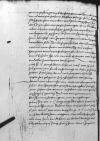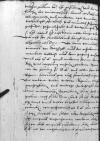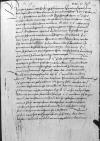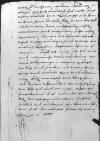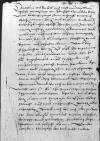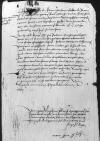Dem erwirdigenn inn Gott unnserm besondernn liebenn freund unnd nachbarnn, herrn ⌊Johansen bischoffen zw Ermlandt⌋
Unnsere freuntliche dinst zuvornn. /
Erwirdiger inn Got besonder lieber freundt unnd nachbar. /
Wir haben aus Euer Lieb ⌊⌋ bedatumbt ⌊Heÿlspergk⌋ denn 18-ten dises lauffendenn monats / derselbenn freuntlichenn nachbarlichenn erbitlichenn willenn, / do wir Euer Lieb neben auch dem erwirdigenn inn Got / unnserm liebenn freundt unnd nachbarnn / hernn ⌊Tidemanno bischoffenn zw Colmensehe⌋ / nites woldenn aufflegenn, / durch beede Euer Lieb vor irem zusamenn khomenn / genn ⌊Graudenz⌋ / under sich / unns zuwillenn / zuhandlenn oder zuberedenn, / in gemeÿner tagfart vortzuneme{me}n, / das unns Euer Lieb wie sÿ gewonet unnd gernn thun, / unbeschwert furderlich freuntlich zudinen geneigt vermergkt. / Nun thun wir unns gegenn Euer Lieb solchs wolmeynendenn erpittens halbenn hochlichenn bedanckenn, / inn sonderer freuntlichenn nachbarschaft / widerumb zuvordinen. /
Unnd wissenn auf dissmahl / uber des, / wes vormals durch unnsere gesandte / beÿ Euer Lieb unnd den andern ⌊koniglichen rethenn⌋ / auf der ⌊tagfart⌋ Stanislai zw ⌊Marienburgk⌋ dÿ gemeynen gebrechenn, / als mautz zölle, / vorbot / und andere beschwerunge betreffende, / wie dan des beede Euer Lieb zuvornn gnugsam verstendig / Euer Lieb nichts auftzulegen. Alle mit unnser freuntlich bith ist, / Euer Lieb wollenn sich unser unnd der unsernn / auch alle varhin gebethene sachenn, damit solche wirglichenn vortgesetzt, / unserm hohem nachbarlichem vertrauen und irem erbithenn nach freuntlichenn bevelhenn sein lassenn. /
Unnd ist inn warheit erschröglichenn zuhoren, / das dem boesenn veinde also vil raum gegebenn, / das durch seine anstiftunge, / umb des zeitlichenn willenn, / das ewige unnd was der seelenn seligkeit belangt, / zurucke geseczt solch grausam mordenn und plutvorgissenn inn der cristenheit ane ursach erreget, / dem Turckenn aber als dem verfolger gotlichs namens / keynn widerstandt gescheen, / ja ime nach gutte bequemig[keit] zum uberfahl der Christen eingereumet und gegeben werdenn solle, / sonder zweiffel Got der allemechtige, wann man inen nur vleissig, / aus rechtem hertzenn unnd worhaftigem glaubenn, / anruffenn unnd bithenn thet, / er wurde dÿ seinen wol erhalden und alles zum bestenn vorfugenn. / Weren auch Euer Lieb derselbenn bithenn nach, / wes sÿ sich zw gemeinem frids erhaldunge / in disen geferlichen zeitten zutrösten / unnd wie sonstenn dÿ leufft itziger zeit gelegenn, / zutzeschreybenn wol geneigt. / Dÿweil wir aber nichts / dan das, / wie obengemeldet, / sich in der Christenheit grosse uneÿnigkeit zwuschen denn hohenn heupternn / erhobenn, / des wie gedacht erschraglich genung / und wes von gemeinenn kauffmans zeittungenn / ann uns gelanget / gewisses, / des Euer Lieb unntzweÿfflich ebenn so wal als unns zukhomenn, / habenn wir doch gleichwol solchs so gut unnd wie es an uns gelangt, / Euer Lieb mitzuteylen nicht underlassenn mögenn, / der allerhachste schike alle ding zum fridlichenn ende / und verleÿhe, das solche plutvergissung / zwuschenn denn Christenn aufgehe... werde / freuntlichenn bittende. / So ann Euer Lieb ettwann gewissers bessers daraus und mehr verhoffen gelangt, / uns auch dasselbe freuntlichenn mittzuleÿlenn. / Mit angeheftem erpithen, wann (wie wir teglichenn hoffen) / uns hinwider von den unsern ettwas zukumbt, / Euer Lieb solches gutwillig wisshaft zumachenn. /
Das dÿ ⌊alde konigliche maiestet⌋ zw ⌊Polann⌋, / unnser gnediger herre unnd freuntlicher gelibter ohaim, / abermals mit solcher schwacheit behaft, / habenn wir mit bekhomerthen hertzenn angehordt, / denn lieben Got bithende er wolle, / wie ers dan inn seiner macht und handt hadt, / denn loblichenn aldenn fromenn konig, / der Cron Polann etc. unnd aller derselbenn eingeleipten landenn und leuthenn, / zutrost und bestem, / gesundt machenn, / unnd in langwiriger wolmögenhen nach seinem gotlichenn willen erhalden. / Welchs wir Euer Lieb, dero wir freuntlichenn zudinenn gewogenn, / uff ir gethanes schreÿbenn antwurtlich / hinwider in ganczer eyl nicht woldenn pergenn. /
Datum ⌊Tapiaw⌋, denn XXIII Septembris anno etc. im XLVI-ten.
Vonn Gottes gnadenn ⌊Albrecht marggraff zw ⌊Brandenburgk⌋, inn ⌊Preussenn⌋, zw ⌊Stettin⌋, ⌊Pommern⌋, der ⌊Cassubenn⌋ und ⌊Wendenn⌋ hertzogk⌋, burggrave zw ⌊Nurmberg⌋ und furst zu ⌊Rugen⌋ manu propria subscripsit
Postscript:
Danebenn wissen Euer Lieb mit wass mutwÿllenn etzliche einwhoner von ⌊Danzigk⌋ nemlich die erben ⌊Lucas Kettings⌋, / sampt irem anhangk unns und etzlichen armen koniglichen und unsernn undersassen vielfeltigk nhun etzliche jhar her mit irer vermeinten nichtigen appellation bekommert und molestiret, / auch noch vonn solchem / unangesehen unnsere habende privilegien, / freÿheiten unnd regalien nit abgestandenn. / Sonder beÿ hochgedachter koniglichen maiestet auff ihr ungestumes anhalten, / soviel erworbenn, / dass seÿn konigliche maiestet ungezweifelt auff vorgehenden nicht / gnugsamenn bericht / unserer habendenn regalienn und freyheiten ahnn unnss begereth. /
Wir solten diese vermeinte nichtige appellationes auff itzig kommend landtgesprech khommen / unnd der orth erkennenn lassen, / welchs wir seiner koniglichen maiestet inn erwegung unserer itzgemelten privilegien, / regalien / unnd freÿheiten, / so wir mit unnss ahn die ⌊Chron⌋ loblich gebracht, / auch new aufgerichteten vertragen billich abgeschlagen / unnd nach der orth ader andersswo daruber / zw eimbruch unserer freyheit, / vertrege / unnd privilegien / handlung zugewartenn nit bedacht seÿnn. / Sonder werden verursacht der und mehr anderer ursachen halbenn konigliche maiestet anzulangen / und die mit zusuchen, / die unvorweislich, / damit wir beÿ alle[n] obenernenthen und anderem wie unns dann vielfeltigk schrieftlich und muntlich zugesagt geschutzet, / gehandthabet und verteydinget. /
Ho... ⌊seine maiestet⌋ werd sich alssdann aller dinge erin... und alss der friedliebende konigk uns dabeÿ bleÿbenn lassenn. / ⌊Dy dann vermutlich ermelte von Danzigk⌋ / auff ire erhaltene ... mandata villeicht auff dem gesprech erscheÿ[nen] unnd beÿ Euer Lieb unnd andernn hernn ⌊konig[lichen] rethen⌋ umb weÿsung anhalten werdenn, / seint wir der hofnung zu Euer Lieb und allen hern ko[niglichen] rethenn, / darumb wir auch freuntlich bitten. Sie werdenn unser, / unserer regalien, / freÿhe[iten], gerechtigkeiten und vertrege indechtigk seÿn. Denn mutwÿlligen appellanten / seiner ⌊stadt⌋ [nit] gebenn / noch zulassenn, / dass sie sich der ges... gegen unnss unnd unsere freÿheit auflegenn und gedencken, / wie beschwerlich ess Euer Lieb sein wur[de], so gegen dieselbe ein solches ader dergleichen besch[wer]liche eingriff vorgenhomen werdenn solthen, ... so wir solche eingriff befordernn solthen / dass ... Euer Lieb nit vor nachbarlich unnd freuntlich vormt... vorstehen ader annhemen wördenn. /
Demnach bittenn wir gantz freuntlich, Euer Lieb wolle sampt ⌊unserm freundt vonn Colmensehe⌋, / auch denn andernn / ⌊hernn koniglichen rethen⌋ ⌊die vonn Dantzigk⌋ alssdann vonn irem muthwylligen nichtigen appellirenn unnd prosequution solcher nichtigen appellationn, / die wir nie deferiret, / noch auch inhalts unserer privilegien unnd vertrege, / ohne einbruch derselbenn / deferiren khonnen, / abweysenn. / Auff dass durch solche Euer Lieb freunt unnd nachparliche / trewe beforderung, / wir dieser beschwerlichenn notigung erlediget, / inn ruhe unnd friedenn mit unserm hernn ⌊konige⌋ unnd freunde seÿnn unnd bleybenn mogen. Auch menniglich vonn koniglichenn und unsern undersassenn vor anfertigung inn ruhe und fried sein moge. / So wir hinwiderumb Euer Lieb und andem hern koniglichen rethen inn gleichem auch mehrern dinstlich, / hulfflich und furderlich sein khonnen, / sollen unns Euer Lieb inn allewege gutwyllig erfinden.
Datum ut in litteris
Enclosure:
Zeittungen:
Es ist ein grosser scharmutzel / zwuschen denn kayserischenn und furstlichen, nicht weit van ⌊Regenspurgk⌋ gehaldenn. / Do habenn dÿ kaiserischen die furstlichen unvarsehens uberfallenn. / Ist vil volck plieben, / doch habenn dÿ furstlichenn denn sig behaldenn, / dÿ ⌊Hispanier⌋ unnd Keyserischen inn dÿ flucht geschlagenn, inen vil geschutz abgedrungen, / derwegen / der keiser grossenn schaden genomen. / Dÿ fursten habenn ⌊Ingolstadt⌋ / wider ann IIII orthen belagert etc.
Sovil seint dissmals zeittungen.

